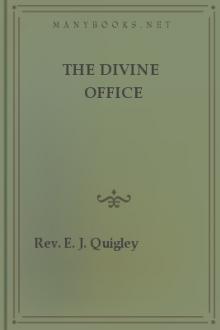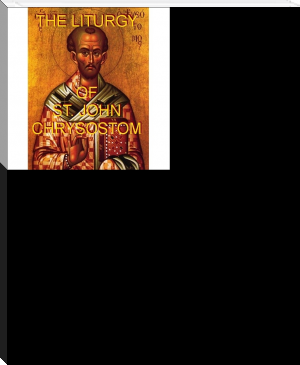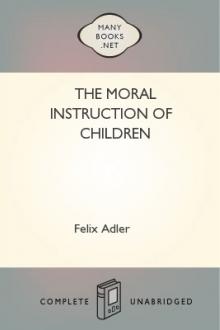The Divine Office by Edward J. Quigley (cool books to read .txt) 📕

- Author: Edward J. Quigley
- Performer: -
Book online «The Divine Office by Edward J. Quigley (cool books to read .txt) 📕». Author Edward J. Quigley
What is a person bound to do who forgets part of an Hour—is he obliged to repeat the full Hour?
He is bound to recite the part forgotten only, unless the mistake be made through gross carelessness, and unless it be a considerable part (e.g., two nocturns); in that case he is bound under pain of venial sin to repeat the full Hour. If a person say the same Hour (e.g., Terce) twice, may he compensate for extra labour by the omission of an equivalent part (e.g., None)? Such omission is unlawful; he must recite all the Hours without omission (Scavini, 391).
Is there an obligation to repeat the Hours in the order fixed in the Breviary? Yes, there is such an obligation. And a person may sin venially by the inversion of the Hours, The obligation binds sub veniali only. The inversion does not mean any grave breach of order, which is fixed by a secondary precept and as a circumstance of light importance. If the whole office be recited, the substance of the office—which is the main and primary matter—is safeguarded. Several authors argued that any inversion of the Canonical Hours, if frequent, is a mortal sin, but the opinion which says that the inversion of the Hours is only a venial sin is the more probable (St. Alph. 169; Gury, 77; Lehmkuhl II., 621).
Which causes justify an inversion of the Hours? Any reasonable cause justifies this inversion. Thus, if a friend invite a priest to joint recitation of an Hour, and the priest have not the preceding canonical Hours recited, he is justified in accepting the invitation and in inverting the order of the Hours. Or if a person have a Diurnal only at hand, he may read the day Hours, although he have not Matins for the day read. Again, a priest may not have the lessons for Matins at hand, but he may recite the psalms for Matins, Lauds, and add the lessons at Matins when they are to hand (Gury, n. 78; St. Alph., n. 170).
Is it a sin to say Matins for following day before finishing office of current day? Some theologians answer affirmatively, because the office of the current day should be complete before another office is begun. Others hold that such recitation is both valid and licit, as the office of one day and its obligation have no bond with the office of another day, and that any reasonable cause exempts from all sin or fault (Gury, n. 79). Not to recite the commemorations in the prescribed order set out in the Ordo is held by some theologians to be a venial sin, as they hold that the rubric is preceptive; others hold that it is not any sin, as they say that the rubric is directive.
ARTICLE III.—TIME OF RECITATION.The time fixed for the recitation of the entire office of the day is from midnight to the midnight following, and anyone bound to recite the Divine Office does not sin gravely if he has recited carefully the entire office of the day between these limits of time; because, within these limits, the substance of the obligation binding to time is fulfilled. Of course, it is lawful in virtue of a privilege granted by the Church to recite on the previous evening Matins and Lauds for the following day. In the recitation the times fixed by the Church for each hour should be observed. But the non-recital at those fixed times is never a mortal sin and is rarely a venial sin, unless their postponement or anticipation is without cause.
When may a priest begin the recitation of Matins and Lauds for the following day? There were two different replies given to this question. One opinion stated that it was lawful to begin Matins and Lauds after 2 o'clock, p.m., and this could be lawfully done every day in the year, and in every land. Another opinion—and St. Alphonsus calls it sententia verior—denies that such a course is lawful. The old French Breviaries gave a horarium arranging the hour of anticipation of Matins and Lauds, so that no one should, through temerity or ignorance, begin the anticipation before the sun had passed half way in its course between mid-day and sunset. On January 20th the time to begin the anticipation of hours was 2.15 p.m., but on June 8th the anticipation was not to begin till 4 p.m.
Nowadays, the first opinion is held almost universally. The principal internal argument for this opinion is the teaching that the anticipation may begin from the public hour of first vespers, and these may be recited publicly according to present-day custom at 2 p.m. Therefore, this time, 2 o'clock p.m., is the beginning of the ecclesiastical day, and can be taken as the time for private anticipation of Matins and Lauds. The external argument in favour of this opinion is the authority of theologians. In 1905, the Sacred Congregation of Rites was asked the question "Utrum in privata recitatione Matutinum sequentis diei incipi possit, 2da pomeriddiane?". The reply was, "Consulantur probati auctores" (Acta Sanctae Sedis XXXVII., p. 712). Now many approved authors (e.g., Lehmkuhl, II., 793; Ballerini-Palmieri, IV. 515; Slater I., p. 609) hold that it is lawful, privately, to anticipate Matins and Lauds at 2 o'clock, p.m. Lehmkuhl, who previously favoured a stricter view, was compelled, in the latest editions of his Moral Theology, to say of this opinion which allows anticipation to begin at 2 o'clock, p.m.: "Quae sententia hodie a multis usque gravissimis viris tenetur et observatur, ut, spectata consuetudine, extrinseca saltem probabilitas negari nequit." We conclude, accordingly, that always and everywhere the private anticipation of Matins and Lauds may begin at 2 p.m. (cf. Irish Ecclesiastical Record, Fifth Series, Vol. I., No. 541).
Doubts have arisen in connection with time changes made by various States in Europe. The various schemes of new time, of daylight saving, of co-ordinations of time, uniformity of time all through certain States, have given rise to doubts and queries regarding the time for fulfilling the precept of the office and also regarding the time for lawful anticipation of Matins and Lauds. These doubts were solved several years ago, and now there is no longer any difficulty or anxiety over "true time," "new time," "legal time," in relation to matters ecclesiastical. In reply to queries, Dr. M. J. O'Donnell, in the Irish Ecclesiastical Record (Vol. III., p. 582), explains clearly this time difficulty and its solution by the Congregation of the Council on 22nd July, 1893. The Bishop of Trier explained to the Congregation of the Council that owing to the State legislation in the German Empire all public clocks should register the same time, and that this meant that in his diocese the legal computation differs by half an hour from the mean time. "May clerics follow the legal time in reciting the Divine Office?" was the bishop's question. The Congregation of the Council answered by a simple affirmative. In 1892, Greenwich time was introduced for State purposes into all railway, postal, and Government offices in Holland. The query was put to the Congregation of the Inquisition if the clergy and people might, for the purpose of fast and other ecclesiastical obligations, follow the new time, or were they obliged to retain the true time? The reply was "affirmative ad primam: negative ad secundam partem." "In a word, the constant Roman answer has been 'Do as you please'; so far as the approval of the legal time is concerned it confirms the conclusion of the editor of the Acta (xxxii-251) that in computing time the Church follows the rule that regulates all business concerns in different localities….
"In the meantime, taking into account the conventional character of 'time' and the liberal principles of Rome in the past, we have no doubt that everyone, priest or layman, is fully justified in following the new time if he feels so inclined." (See Codex Juris. Canon., Can. 33).
Are priests bound to recite Matins and Lauds before Mass?
The first sentence of the Ritus servandus in celebratione Missae in the Missal contains the clause "saltem Malutino cum Laudibus absoluto," The word saltem indicates that the Church notifies the minimum and expects a further hour, Prime or even others of the small hours, to be finished before Mass. But theologians hold that there is no grave obligation for such prior-to-Mass recital, and that any reasonable cause excuses from the obligation (Lehmkuhl II., 628). In connection with this matter a very instructive and devotional essay in the Irish Ecclesiastical Record (Fourth Series XXXI., n. 533) by Father M. Russell, S.J., is well worth reading. It is entitled "A Neglected Adverb"; the adverb being saltem, from the clause quoted.
At what times should the small hours be recited? Prime may be, and, probably with more appropriateness, should be used as morning prayer and said before Mass. Terce and Sext may be said before mid-day, or Sext and None may be said after mid-day. Vespers should be said after mid-day. Compline was the night prayer of the monks, who probably instituted the hour. It should be borne in mind that the substance of the law of recitation is fulfilled if the whole office of the day be recited before midnight, and that the obligation for entire and complete recitation is grave; while the recitation of the hours at set hours of the day is a light obligation.
ARTICLE IV.-OF THE PLACE OF RECITATION AND THE ATTITUDE IN RECITING THE OFFICE.Where should the Divine Office be recited? The Divine Office should be recited in the place intended and set apart by the Church for that purpose—viz., in the choir or in the Church (Con. Trid., sess. 24). Canons and religious are bound to recite their office in choir; of course, this refers to Canons in residence at a cathedral for daily service, and to religious in the strict application of the term. The Divine Office may be recited by priests anywhere, in the church, in a dwelling-house, walking, in the fields, etc.
In reciting the office a priest should observe an attitude in harmony with the great work in which he is engaged, prayer to God. Hence, his attitude should be becoming, on his knees, standing, sitting, walking, but not sprawling or lying. The rubrics which prescribe kneeling, sitting, standing, apply to choir recitation only. But writers recommend that in private recitation these directions should not be altogether omitted, and they say that the practice of these rubrics of kneeling, bowing, standing, etc., is laudable and an aid to devout recital.
ARTICLE V.—PRONUNCIATION OF THE WORDS.What kind of pronunciation is to be attended to in the recitation of the Divine Office? The pronunciation should be vocal—that is, there should be some sound, aliquis sonitus verborum, as St. Alphonsus writes (n. 162). Hence, to read the Breviary merely mentally or with the eyes only, does not satisfy the obligation.[A] Although the reader may not hear the sound produced, he must be careful to form with his lips every syllable. This must be done, not necessarily in a throaty way. The formation of the words clearly with the lips suffices. But writers on this point emphasise the importance of audible recitation as a preventive of slurred, mutilated Latinity, which often leads to careless, or even invalid recitation. They note, too, that the reading with the eye merely, is a habit which readers bring from the reading of other books to their reading of the Breviary. German authors dwell at length on the fact that many priests, very early in their career, contract the habit of faulty vocalisation of liturgy, and that they never seem to notice their fault, or at least never seem to attempt an amendment. These authors attribute the defect to sub-voce recitation and recommend audible recitation, long and frequent audible recitation, to all priests reading their hours.
[Footnote A: The privilege of mental recitation was granted to the Friar Minor by Pope Leo X. and Pius V., but it is probable that the privilege was withdrawn by Pope Gregory XV. in 1622, in his letter Romanus Pontifex; and Urban VIII., 1635, withdrew all privileges granted vivae vocis oraculo. The text of the document granting the privilege is obscurely worded. Still, several theologians of repute maintain that the privilege still exists





Comments (0)